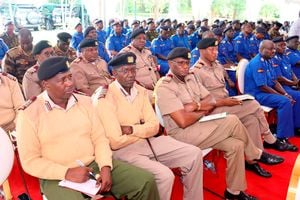Breaking News: Former Lugari MP Cyrus Jirongo dies in a road crash

Deputy President Rigathi Gachagua with Interior Cabinet Secretary Kithure Kindiki during a forum in Nyeri town on strategies of ending alcohol and substance abuse in Mt Kenya region on April 14, 2023.
The government’s decision to give immense powers to the police as well as regional and county security committees is littered with landmines, given public officers’ interests in such businesses.
Some of the sweeping powers that the security committees have been given in the measures announced by Deputy President Rigathi Gachagua and Interior Cabinet Secretary Kithure Kindiki include inspecting licences issued to bars and other outlets.
Those found to be flouting the provisions of the Alcoholic Drinks Control Act—including being within 300 metres of schools or residential areas— and those deemed illegal will be shut down with immediate effect.
All alcohol manufacturers will also be required to furnish county security teams with the geo-location and physical details of their licensed premises, as well as stock records per licensed premise.
Any premises not on the list but found stocking or manufacturing alcohol will be deemed illegal. The security committees will also be tasked with ensuring that all facilities used in storage, manufacturing and trafficking of illegal drugs and alcohol are seized and ownership taken by the government.
They will also, in partnership with the Ministry of Health, come up with branding and colour specification of all alcoholic and tobacco distribution vehicles, and ensure that transportation is only done between 6am and 6pm.
Former administrator Joseph Kaguthi told the Nation that “former President Daniel Moi used to tell us he knew where an enforcement problem persisted, his security officers must be the criminals”. Mr Kaguthi, who served as the pioneer National Authority for the Campaign Against Drug Abuse (Nacada) coordinator in 2006 added that “there are serious gaps in entrusting security committees to oversight themselves in implementing policies affecting their members”.
He wondered how senior police officers will supervise themselves in closing down the bars that they or their spouses and relatives own. “The problem is endemic than espoused and is more cancerous than diagnosed,” he said.
Yesterday, National Assembly Minority leader Opiyo Wandayi said the “indiscriminate” clampdown on bars and hotel businesses was only hurting the economy. He singled out Kisumu, where he claimed the implementation of the edict has caused untold suffering to legitimate business owners.
“However well-intentioned the move could have been, it is now targeting licensed businesses operating well outside residential areas and estates. A case in point is the Mamba Hotel in Kisumu, a facility that has operated legally for decades. It has now been shut down,” said Mr Wandayi.
He stated that illicit alcohol consumption is not a problem in the greater Western Kenya region as it could be in other parts of the country.
According to him, the biggest problem in the region is unemployment, which the government should deal with urgently.
“Paradoxically, the forceful closure of licensed alcohol businesses will only compound the problem of joblessness and escalate crime levels in the region,” said Mr Wandayi. Senior officers will vet their juniors to ascertain their suitability to man the Namanga, Isebania, Moyale and Isiolo border points, highways and regional offices.
They will also be the ones to effect a total ban on importation, manufacture, sale, use, advertisement, promotion or distribution of shisha in the country.
Mr Gachagua, who is spearheading the war on illicit alcohol in the country, stated that in order to eliminate conflict of interest in enforcement, all police officers and other State officers involved in the implementation of the directive were banned from owning alcohol outlets.
In following up on this, the police leadership, through Deputy Inspector-General Douglas Kanja, on Thursday released a signal directing all officers who own alcohol outlets to sell them, close them or resign.
“It has been noted with a lot of concern that very many police officers own and operate bars, clubs and wines and spirits businesses all over the country,” Mr Kanja’s signal reads.
“This is against the Public Officers Ethics Act and you have been directed that all public officers in the enforcement and compliance chain, police officers included, shall not own and operate bars directly or via proxy”.
He concluded by directing that “all police officers currently operating such premises are required to shut them down or resign from the National Police Service (NPS) with immediate effect”.
And to further corner the officers, Prof Kindiki yesterday ordered the immediate transfer of police officers who have served in one station for more than three years, saying among them are those notorious for conflict of interest and sabotage.
He said he wants a team that will deliver on the war on alcoholism in a complete departure from past operations that were hampered by competing political and commercial interests, adding that the ongoing exercise is a security operation to tackle a national threat.
While meeting security teams in Kiambu and Murang'a counties, Prof Kindiki said manufacture, sale and consumption of illicit alcohol and narcotic drugs is a major national security threat that the government will eradicate ruthlessly to protect and secure present and future generations.
Murang’a Senator Joe Nyutu said that all those involved in the fight will have to be more vigilant so as to help the DP to win the war, “especially in Mt Kenya region where we are risking a generation, sort of genocide, in the hands of killer brews and narcotics”.
Mr Nyutu added that “it is not a secret that the networks and related impunity troubling us has many officers in the mix and who for a daily and weekly bribe have let the dragon of illicit brews and narcotics grow and become a vampire that mercilessly slays”.
The legislator said the country’s biggest hope in the war is that “both the President and his deputy appear dead serious this time round and their instruments of power have no wriggling space to play monkey business”. Kirinyaga Woman Rep Njeri Maina said: “You need not look further to know how involved some of our security officers are in this menace ... you only need to know that four police officers in Kirinyaga have since been charged with suspicion that they sold the poisonous brew that killed 23 people in my home village”.
She called on all those who have been complaining about the alcoholism menace to come together and volunteer to provider oversight over the public officers to ensure they do what they are supposed to.
“We have been having a problem with some officers but I now feel satisfied that anyone nabbed sabotaging the exercise of keeping this nation sober will get a shocker that will reverberate to all accomplices,” Maragua MP Mary wa Maua said. According to the MP, there are some serious cases of indiscipline among officers, some who even directly sell narcotics as their seniors do nothing despite being in the know. “But the seriousness of the President and his deputy in this war will shock them”.












